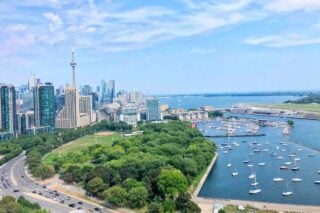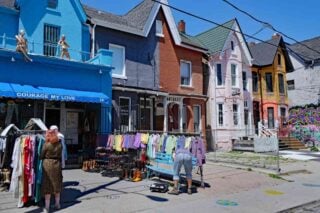 For many foreigners, living in Toronto is a dream come true. As one of the world’s great melting pots, the city is home to a diverse immigrant and expat community representing over 200 nationalities. This multicultural atmosphere is one of the main reasons Toronto is so attractive to people from around the world.
For many foreigners, living in Toronto is a dream come true. As one of the world’s great melting pots, the city is home to a diverse immigrant and expat community representing over 200 nationalities. This multicultural atmosphere is one of the main reasons Toronto is so attractive to people from around the world.
Many newcomers find it easy to integrate into the city’s vibrant and welcoming population. Toronto also offers a high quality of life and a low crime rate, which further adds to its appeal.
This article covers everything you need to know about living in Canada’s most populous city, including insights into the city’s climate, cost of living, housing options, and health insurance coverage.
Get our monthly newsletter filled with tips and information for people living, moving, and traveling outside of their home country.* *By submitting your email, you agree to receive monthly updates for expats, digital nomads, retirees, and more.
Is Toronto a Good Place for Expats to Live?
Toronto is Canada’s largest city. Expats love it because more than 50% of the population is foreign-born, making it a welcoming place for immigrants.
Benefits of Living in Toronto
Toronto provides a high standard of living — and a high quality of life — for its residents. Here, you’ll find a strong job market, some of the best schools in the province of Ontario, and an efficient public transit system that makes it easy to get around.
As the capital of Ontario and a major international hub, it has no shortage of entertainment and recreation. Given the world-class shopping, lush green spaces, dynamic nightlife, and hip art galleries and cafes, not to mention the renowned Toronto International Film Festival (TIFF), there’s always something to see and do.
If it’s a safe city you’re seeking, Toronto won’t disappoint. Its low crime rate has made it the safest city in Canada. But like all big cities, crime does exist. Internet scams and petty crimes, such as bicycle theft and shoplifting, are the most common.
Challenges of Living in Toronto
Despite all that the city of Toronto has to offer, it has some downsides.
For one, Toronto’s excellent quality of life comes at a high price. One of the biggest challenges that immigrants face when moving to Toronto is the city’s expensive real estate market.
As of 2024, the average cost to buy a home in Toronto is $1.2 million USD. Rates have started to drop as buyers become less willing to purchase homes at that price, but the drop has been slight at best. Meanwhile, the cost to rent an apartment or house in Toronto is still on the rise.
If you’re thinking about moving to Toronto, it’s important to understand that the city’s pricey rental and mortgage costs are the norm. Keep in mind that it’s not just the real estate market that will cost you. Steep housing prices have increased the overall cost of living in Toronto, from retail to groceries to healthcare.
Toronto’s Climate and Weather
Toronto has a semi-continental climate with cold winters and warm, humid summers. During the winter, it is one of Canada’s warmest cities, but you should still expect snowstorms and frigid temperatures.
Even though the city is upwind from Lake Ontario and lake-effect snow is rare, there is snow on the ground most days between mid-December and mid-March. In mid-January, average temperatures at night are between -7 and -1 degrees Celsius (19 to 30 degrees Fahrenheit).
For a Step by Step Guide to Moving Abroad, download the free 20-page checklist.* *By submitting your email, you agree to receive monthly updates for expats, digital nomads, retirees, and more.
How Much Does It Cost to Live in Toronto?
The cost of living in Canada is higher than in most countries. Toronto and the west coast city of Vancouver are the two most expensive Canadian cities.
The average cost of living for a single person is estimated at about $3,250 USD per month, mostly due to the high cost of housing. If you’re set on moving to a big city but want lower property costs and rental rates, Montreal and Ottawa are a bit more affordable.
Depending on where you’re moving from, Toronto may be much more expensive than what you’re used to — or much more affordable. One way to gauge the difference is to see where Toronto ranks among other major cities on the cost of living index. (Note: The cost of living index is a theoretical price index that measures how expensive or inexpensive a particular location is in comparison to other regions. The higher the number, the more expensive it is to pay for goods and services in that location.)
Here’s a look at how the cost of living index in Toronto compares to other large cities around the world. Figures above the cost of living baseline of 100 are considered more expensive, while figures below 100 are typically considered less expensive.
- Zurich, Switzerland: 118.3
- New York, New York: 100.0
- Reykjavik, Iceland: 88.5
- Singapore, Singapore: 81.9
- London, England: 80.1
- Copenhagen, Denmark: 79.0
- Sydney, Australia: 75.9
- Toronto, Canada: 71.6
- Hamburg, Germany: 69.8
- Brussels, Belgium: 67.3
- Dubai, UAE: 63.0
- Tokyo, Japan: 57.4
What Are the Best Neighborhoods for Expats in Toronto?
Toronto is divided into four districts. Each district is home to a variety of great neighborhoods.
Riverdale, Yonge and Eglinton, Bayview Village, and the Distillery District are some of the top residential communities for Canadian citizens and foreigners alike.
Riverdale
With excellent schools, amazing restaurants, and lots of shopping, Riverdale is ideal for families. It’s only 4 km (2.5 miles) to the city center, providing quick access to everything Toronto has to offer.
Yonge and Eglinton
Yonge and Eglinton is a fantastic spot for young professionals. This part of the city features desirable detached single homes and condo options. It’s just 6 km (3.7 miles) from the bustling downtown core.

Bayview Village
Ideal for retirees, Bayview Village offers gorgeous waterfront properties. Medical offices, retail shops, and restaurants are within easy reach. Located 14 km (9 miles) from downtown Toronto, it’s simple to reach all parts of the city from here.
Distillery District
The Distillery District is a pedestrian-only downtown neighborhood and a top destination for arts, culture, and entertainment. Condos with upscale amenities, high-end restaurants and shops, and art galleries have increased its popularity among young professionals. Kensington Market is another Toronto neighborhood with a similar appeal.
Getting Around Toronto
Toronto is a walkable city. If you live in or near the downtown area, you don’t even need a car. This bike-friendly city has designated bike lanes and bike-share programs, making it convenient even for Torontonians who don’t already own a bicycle.
In downtown Toronto, traffic congestion is an issue, and parking options are sparse, especially during rush hour. Many people prefer not to drive in the city.
To combat the hassle of driving in traffic, the Greater Toronto Area (GTA) has a good public transportation system called the Toronto Transit Commission (TTC). The TTC makes it possible to swiftly travel in and around the city center and suburbs via subway, streetcar, and bus transit routes.
Health Insurance Options for Expats in Toronto
Canada has a universal healthcare system, but each of the country’s provinces oversees its own version of the program. Foreigners who move to Toronto may qualify for the Ontario Health Insurance Plan (OHIP).
OHIP covers the cost of family doctor visits, emergency room and hospital care, diagnostic testing, and medically necessary treatment for injuries or illnesses. It does not cover elective or cosmetic procedures, and it does not cover vision or dental care. However, OHIP makes exceptions for routine annual eye exams for children and seniors, as well as certain in-hospital dental surgeries.

Find the Best International Insurance
- Compare multiple quotes and coverage options
- Work with an insurance expert at no additional cost
- Find the best plan for your needs and budget
If you are a foreign resident of Toronto or another Ontario city and want to use Canada’s public healthcare system, you can apply for OHIP. You may qualify for OHIP if:
- You have Canadian citizenship, permanent residency, or other immigration status as set out in the Ontario Health Insurance Act.
- You have physically resided in Ontario for 153 days in any 12-month period.
- Your permanent and primary residence is located in Ontario.
OHIP coverage makes it easy for qualifying Canadian residents to access necessary and routine medical care. However, the system is not perfect. Wait times to see a doctor for non-emergency care can be long, and you often need a referral in order to see a specialist.
Many immigrants in Toronto choose to supplement their OHIP coverage by purchasing an international private medical insurance plan. A private health insurance plan can help you avoid lengthy wait times, get coverage for more services, and gain access to better quality doctors and care.
Read More: Healthcare in Canada
Toronto or Beyond? Finding the Right City to Call Home
Toronto offers an exciting and diverse environment, making it a top choice for many expats. However, it’s important to weigh both the advantages and challenges before making the move.
If you’re drawn to Canada but unsure whether Toronto is the best fit, there are plenty of other cities and towns across Ontario and the rest of the country that may better align with your lifestyle and preferences. Take the time to explore all your options to make the best decision for your future.
Ultimately, your new home should match both your professional and personal goals. Whether in Toronto or beyond, choosing the right city is a crucial step toward building a fulfilling life abroad.
